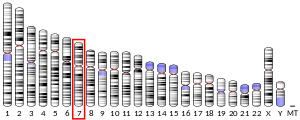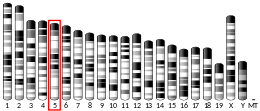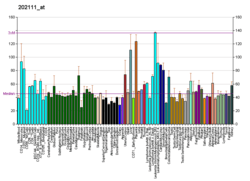Anion exchange protein 2
Anion exchange protein 2 (AE2) is a membrane transport protein that in humans is encoded by the SLC4A2 gene.[5][6] AE2 is functionally similar to the Band 3 Cl−/HCO3− exchange protein.
Mice have been used to explore the function of AE2. AE2 contributes to basolateral membrane HCO3− transport in the gastrointestinal tract.[7] AE2 is required for spermiogenesis in mice.[8] AE2 is required for normal osteoclast function.[9][10] The activity of AE2 is sensitive to pH.[11]
AE3 has been suggested as a target for prevention of diabetic vasculopathy.[12]
See also
References
- GRCh38: Ensembl release 89: ENSG00000164889 - Ensembl, May 2017
- GRCm38: Ensembl release 89: ENSMUSG00000028962 - Ensembl, May 2017
- "Human PubMed Reference:". National Center for Biotechnology Information, U.S. National Library of Medicine.
- "Mouse PubMed Reference:". National Center for Biotechnology Information, U.S. National Library of Medicine.
- Tanner MJ (Mar 1993). "Molecular and cellular biology of the erythrocyte anion exchanger (AE1)". Semin Hematol. 30 (1): 34–57. PMID 8434259.
- "Entrez Gene: SLC4A2 solute carrier family 4, anion exchanger, member 2 (erythrocyte membrane protein band 3-like 1)".
- Gawenis LR, Bradford EM, Alper SL, Prasad V, Shull GE (April 2010). "AE2 Cl−/HCO3− exchanger is required for normal cAMP-stimulated anion secretion in murine proximal colon". Am. J. Physiol. Gastrointest. Liver Physiol. 298 (4): G493–503. doi:10.1152/ajpgi.00178.2009. PMC 2853300. PMID 20110461.
- Medina JF, Recalde S, Prieto J, Lecanda J, Saez E, Funk CD, Vecino P, van Roon MA, Ottenhoff R, Bosma PJ, Bakker CT, Elferink RP (December 2003). "Anion exchanger 2 is essential for spermiogenesis in mice". Proc. Natl. Acad. Sci. U.S.A. 100 (26): 15847–52. doi:10.1073/pnas.2536127100. PMC 307656. PMID 14673081.
- Wu J, Glimcher LH, Aliprantis AO (November 2008). "HCO3−/Cl− anion exchanger SLC4A2 is required for proper osteoclast differentiation and function". Proc. Natl. Acad. Sci. U.S.A. 105 (44): 16934–9. doi:10.1073/pnas.0808763105. PMC 2579356. PMID 18971331.
- Josephsen K, Praetorius J, Frische S, Gawenis LR, Kwon TH, Agre P, Nielsen S, Fejerskov O (February 2009). "Targeted disruption of the Cl−/HCO3− exchanger Ae2 results in osteopetrosis in mice". Proc. Natl. Acad. Sci. U.S.A. 106 (5): 1638–41. doi:10.1073/pnas.0811682106. PMC 2635809. PMID 19164575.
- Stewart AK, Kurschat CE, Vaughan-Jones RD, Alper SL (March 2009). "Putative re-entrant loop 1 of AE2 transmembrane domain has a major role in acute regulation of anion exchange by pH". J. Biol. Chem. 284 (10): 6126–39. doi:10.1074/jbc.M802051200. PMC 2649077. PMID 19103596.
- Huang QR, Li Q, Chen YH, Li L, Liu LL, Lei SH, Chen HP, Peng WJ, He M (June 2010). "Involvement of anion exchanger-2 in apoptosis of endothelial cells induced by high glucose through an mPTP-ROS-Caspase-3 dependent pathway". Apoptosis. 15 (6): 693–704. doi:10.1007/s10495-010-0477-9. PMID 20180022.
Further reading
- Gehrig H, Müller W, Appelhans H (1992). "Complete nucleotide sequence of band 3 related anion transport protein AE2 from human kidney". Biochim. Biophys. Acta. 1130 (3): 326–8. doi:10.1016/0167-4781(92)90446-7. PMID 1562608.
- Korsgren C, Cohen CM (1988). "Associations of human erythrocyte band 4.2. Binding to ankyrin and to the cytoplasmic domain of band 3". J. Biol. Chem. 263 (21): 10212–8. PMID 2968981.
- Demuth DR, Showe LC, Ballantine M, et al. (1986). "Cloning and structural characterization of a human non-erythroid band 3-like protein". EMBO J. 5 (6): 1205–14. doi:10.1002/j.1460-2075.1986.tb04348.x. PMC 1166929. PMID 3015590.
- Palumbo AP, Isobe M, Huebner K, et al. (1986). "Chromosomal localization of a human band 3-like gene to region 7q35----7q36". Am. J. Hum. Genet. 39 (3): 307–16. PMC 1683956. PMID 3020980.
- Rybicki AC, Musto S, Schwartz RS (1995). "Identification of a band-3 binding site near the N-terminus of erythrocyte membrane protein 4.2". Biochem. J. 309. ( Pt 2) (2): 677–81. doi:10.1042/bj3090677. PMC 1135783. PMID 7626035.
- Havenga MJ, Bosman GJ, Appelhans H, De Grip WJ (1995). "Expression of the anion exchanger (AE) gene family in human brain. Identification of a new AE protein: AE0". Brain Res. Mol. Brain Res. 25 (1–2): 97–104. doi:10.1016/0169-328X(94)90283-6. PMID 7984058.
- Bonaldo MF, Lennon G, Soares MB (1997). "Normalization and subtraction: two approaches to facilitate gene discovery". Genome Res. 6 (9): 791–806. doi:10.1101/gr.6.9.791. PMID 8889548.
- Medina JF, Acín A, Prieto J (1997). "Molecular cloning and characterization of the human AE2 anion exchanger (SLC4A2) gene". Genomics. 39 (1): 74–85. doi:10.1006/geno.1996.4467. PMID 9027488.
- García C, Montuenga LM, Medina JF, Prieto J (1998). "In situ detection of AE2 anion-exchanger mRNA in the human liver". Cell Tissue Res. 291 (3): 481–8. doi:10.1007/s004410051017. hdl:10171/20151. PMID 9477304.
- Jöns T, Drenckhahn D (1998). "Anion exchanger 2 (AE2) binds to erythrocyte ankyrin and is colocalized with ankyrin along the basolateral plasma membrane of human gastric parietal cells". Eur. J. Cell Biol. 75 (3): 232–6. doi:10.1016/s0171-9335(98)80117-9. PMID 9587054.
- Mobasheri A, Golding S, Pagakis SN, et al. (1999). "Expression of cation exchanger NHE and anion exchanger AE isoforms in primary human bone-derived osteoblasts". Cell Biol. Int. 22 (7–8): 551–62. doi:10.1006/cbir.1998.0299. PMID 10452823.
- Hyde K, Harrison D, Hollingsworth MA, Harris A (1999). "Chloride-bicarbonate exchangers in the human fetal pancreas". Biochem. Biophys. Res. Commun. 263 (2): 315–21. doi:10.1006/bbrc.1999.1367. PMID 10491290.
- Holappa K, Mustonen M, Parvinen M, et al. (1999). "Primary structure of a sperm cell anion exchanger and its messenger ribonucleic acid expression during spermatogenesis". Biol. Reprod. 61 (4): 981–6. doi:10.1095/biolreprod61.4.981. PMID 10491633.
- Karet FE, Finberg KE, Nayir A, et al. (2000). "Localization of a gene for autosomal recessive distal renal tubular acidosis with normal hearing (rdRTA2) to 7q33-34". Am. J. Hum. Genet. 65 (6): 1656–65. doi:10.1086/302679. PMC 1288376. PMID 10577919.
- Medina JF, Lecanda J, Acín A, et al. (2000). "Tissue-specific N-terminal isoforms from overlapping alternate promoters of the human AE2 anion exchanger gene". Biochem. Biophys. Res. Commun. 267 (1): 228–35. doi:10.1006/bbrc.1999.1951. PMID 10623603.
- Vince JW, Reithmeier RA (2000). "Identification of the Carbonic Anhydrase II Binding Site in the Cl−/HCO3− Anion Exchanger AE1". Biochemistry. 39 (18): 5527–33. doi:10.1021/bi992564p. PMID 10820026.
- Holappa K, Suokas M, Soininen P, Kellokumpu S (2001). "Identification of the full-length AE2 (AE2a) isoform as the Golgi-associated anion exchanger in fibroblasts". J. Histochem. Cytochem. 49 (2): 259–69. doi:10.1177/002215540104900213. PMID 11156694.
- Soleimani M, Greeley T, Petrovic S, et al. (2001). "Pendrin: an apical Cl−/OH−/HCO3− exchanger in the kidney cortex". Am. J. Physiol. Renal Physiol. 280 (2): F356–64. doi:10.1152/ajprenal.2001.280.2.f356. PMID 11208611.
This article incorporates text from the United States National Library of Medicine, which is in the public domain.
This article is issued from Wikipedia. The text is licensed under Creative Commons - Attribution - Sharealike. Additional terms may apply for the media files.




